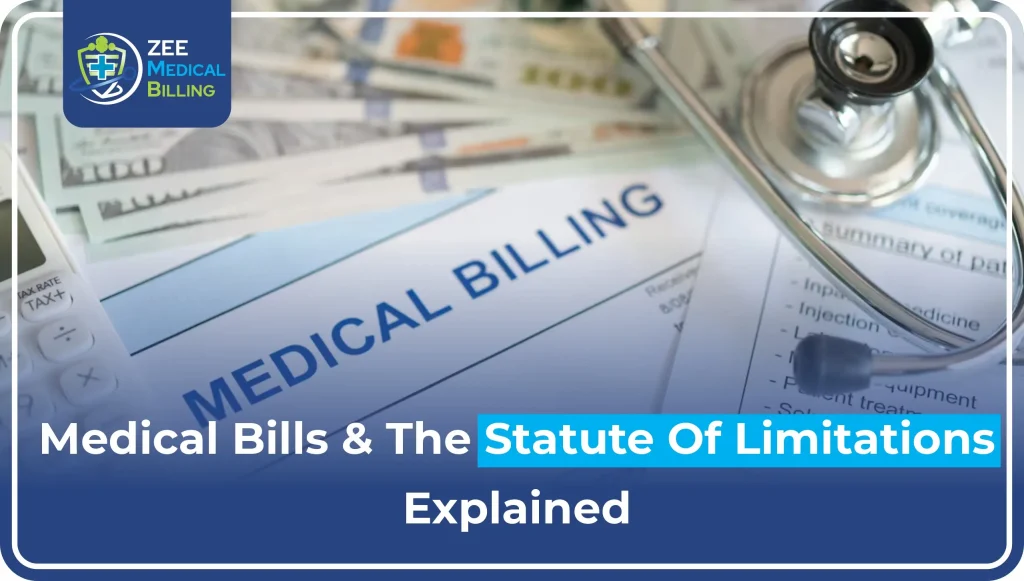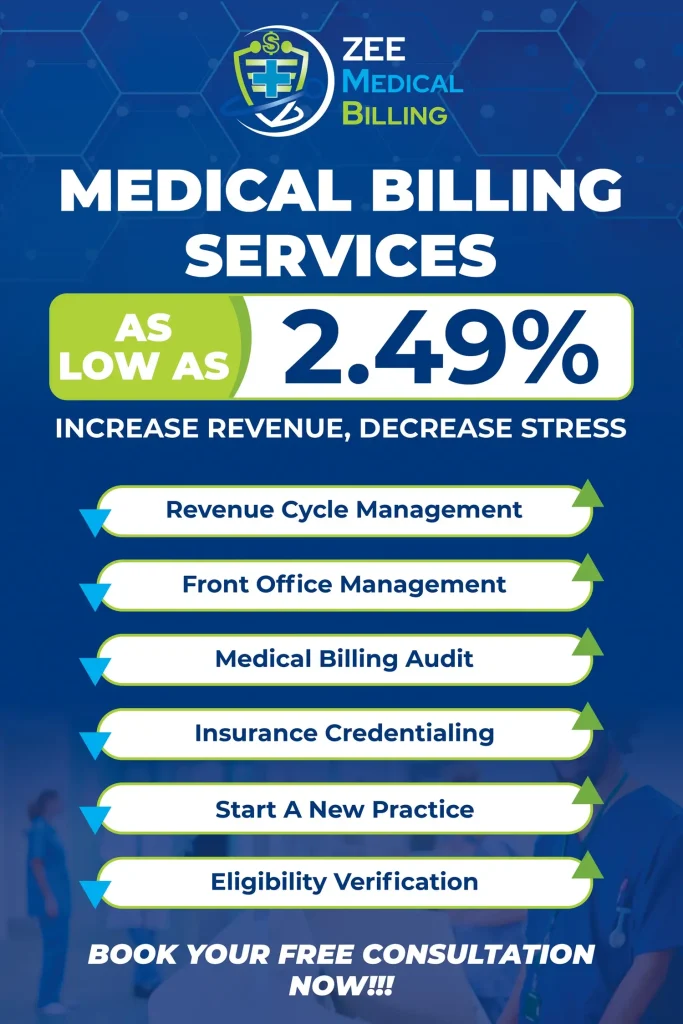Understanding medical billing can be confusing. This is especially true when critical legal issues, like the statute of limitations, come into play.
If you’ve ever wondered how long hospitals have to bill you, you’re not alone. What happens if a medical provider sends you a bill months or even years later? This guide explains the legal time limits. It helps you understand your rights and responsibilities regarding medical debt.
What Is the Statute of Limitations on Medical Bills?
The statute of limitations is the legal time frame in which a healthcare provider or debt collector can initiate a lawsuit to collect unpaid medical bills. This varies by state and depends on the type of agreement—oral or written.
Common Time Limits
| State Type | Typical Limit | Notes |
| Oral Agreement | 2–3 years | Less common in medical billing |
| Written Contract | 4–6 years | Most medical bills fall here |
The countdown typically starts from the date of the last payment or the date the bill was issued.
Read More: Affordable Medical Billing Services for Small Practices
How Long Do Medical Providers Have to Send a Bill?
The time a doctor or hospital has to bill you often depends on your insurance type:
For Insurance Claims
- Medicare: Must submit claims within 12 months.
- Private Insurance: Usually within 90 to 180 days, though plans vary.
For Patients (Self-Pay or Copay)
No universal federal law exists, but most states allow a few months to a couple of years.
In addition, provider agreements with insurers may require providers to submit charges within a certain number of days. Delays in submitting claims can result in denials that insurers may then pass on to patients.
Why You Might Receive a Medical Bill One Year Later?
Delayed billing can happen due to:
- Insurance processing errors
- Backlogs in hospital billing departments
- Incorrect patient information
- Appeals or claim denials
A delayed bill might still be legally valid, even if it seems unfair. This depends on the statute of limitations in your state.
Some patients might not get a bill right away. This can happen if there are disputes between the hospital and the insurance. It can also happen if internal audits find unpaid charges. Always review such bills carefully and request an itemized breakdown.
What Happens After the Time Limit Expires?
Once the statute of limitations expires:
- The medical provider cannot sue you to collect.
- However, debt collectors may still attempt to contact you.
- If you make a payment or promise to pay, it may restart the clock in some states.
Tip: Always check your credit report and state laws before responding to an old medical bill.
Medical Billing Time Limits by State (Examples)
| State | Statute of Limitations | Applies To |
| California | 4 years | Written contracts |
| Texas | 4 years | Written contracts |
| New York | 6 years | Written contracts |
| Florida | 5 years | Written contracts |
| Illinois | 5 years | Written contracts |
⚠️ These are general estimates. Always verify with your state’s specific legal guidelines.
How Long Do You Have to Pay a Medical or Dental Bill?
Unlike the statute of limitations for lawsuits, billing deadlines for patients are often set by insurance or provider policy:
- Hospitals may ask for payment within 30–90 days.
- Dental offices often follow similar timelines.
- Medicaid/Medicare patients must review the Explanation of Benefits (EOBs) quickly to catch discrepancies.
If ignored, unpaid balances can quickly move to collections. Talking to providers is essential if you need a payment plan. Many of them offer low or no-interest options.
Medical Insurance and Billing: Who’s Responsible?
Medical insurance helps cover expenses, but it’s your responsibility to:
- Ensure claims are processed correctly.
- Review EOBs for any rejected services.
- Pay remaining balances not covered by insurance (deductibles, copays).
Even if your insurance delays processing, the bill remains your obligation, so keep communication open with both parties.
Read More: What Happens If You Don’t Pay a Hospital Bill in USA?
Can someone collect medical bills after many years?
Yes, collections can persist even if the legal window to sue has expired. Collection agencies may:
- Report the debt to credit bureaus (usually up to 7 years).
- Call or mail notices.
- Offer settlement options.
But remember, they cannot take legal action beyond the statute of limitations.
Some states have rules about how long debt can stay on your credit report. They also limit what collection agencies can do. Always verify any debts before paying them.
Protecting Yourself: Best Practices
- Keep records of all medical visits and payments.
- Communicate in writing with providers or collectors.
- Know your state laws about medical billing time limits.
- Never ignore medical bills, even if they seem late or incorrect.
- Consult legal aid if you’re unsure of your rights.
FAQs
1. Is there a statute of limitations on medical bills?
Yes. The statute of limitations varies by state and typically ranges from 2 to 6 years. It determines how long a healthcare provider or collection agency can sue you for unpaid bills. However, this does not mean you don’t owe the debt. It just means that no one can take legal action to make you pay. Always check your state’s rules for both oral and written contracts.
2. How long do hospitals have to bill you after a visit?
Most hospitals try to bill within 30 to 180 days, but there is no federal law requiring this. Insurance providers like Medicare have a 12-month deadline for claims. Private insurers usually require billing within 90 to 120 days. If you receive a bill long after treatment, it may still be valid. Contact the provider to verify the reason for the delay.
3. What should I do if I receive a medical bill a year later?
First, don’t ignore it. Check with your insurance to confirm if they cover the service. Request a detailed, itemized bill from the provider. If you believe it’s incorrect or exceeds your state’s statute of limitations, you may dispute it in writing. Always keep a record of all communications in case the matter escalates to collections.
4. Do I have 180 days to pay a medical bill?
Not always. Some providers offer a 180-day grace period for payment, but others require payment within 30 or 60 days. This timeline depends on the provider’s internal policy and insurance agreements. If you can’t pay the full amount, contact the provider’s billing department. They can help you set up a payment plan or ask about financial assistance.
5. How long can unpaid medical bills impact my credit report?
Unpaid medical debt can stay on your credit report for up to 7 years. However, as of recent credit reporting changes, unpaid medical debts under $500 may not appear at all. The three major credit bureaus now offer a 12-month grace period. This means they will not report unpaid medical debt right away. Patients have more time to settle disputes or arrange payments.
Conclusion
Understanding the statute of limitations on medical bills is essential to managing your healthcare finances responsibly. Time limits differ by state and type of contract. Knowing when you must pay can help you avoid stress and financial issues. It also helps you understand when a provider may be too late to collect.
Always check your local laws, communicate clearly with your medical provider, and stay informed. If you ever feel unsure, seek advice from a healthcare billing expert or legal counsel.
Need Expert Medical Billing Services?
Zee Medical Billing offers professional billing solutions tailored to healthcare providers nationwide. In addition to providing top-tier support from our main office, we proudly serve clients in 19 states: Illinois, Indiana, California, Kentucky, New York, Washington, Georgia, Alabama, South Carolina, Texas, Pennsylvania, Ohio, New Hampshire, Nevada, Massachusetts, Hawaii, Arizona, and Colorado. Whether you’re looking to streamline your revenue cycle or improve claims accuracy, you can reach out to us to learn more about how we can support your practice.









